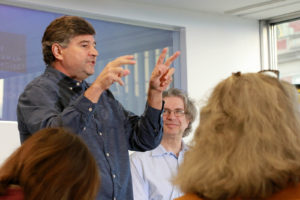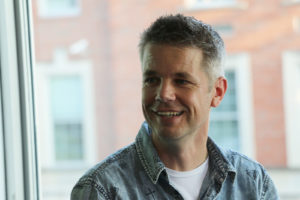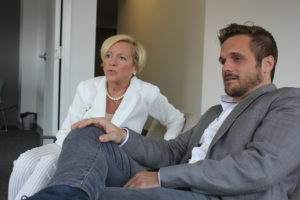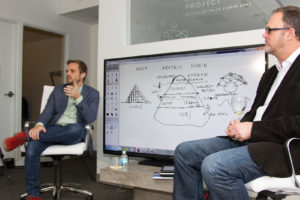Work Like Humans Do
WorkHuman 2017 Day One
The conference is called Workhuman. And on the first day of this gathering of the most forward-thinking minds in workplace culture, Chaz Bono — advocate, writer, transgender son of Sonny Bono and Cher – was asked what the name of the conference meant to him.
He replied with a question of his own: “How else are we going to work?”

That question signifies the timbre of the Workhuman 2017 Conference in Scottsdale, Arizona. Sponsored by Globoforce is an annual “Woodstock for human resources.” The tone of this first day of the conference was decidedly bold encompassed in the tagline “You Belong Here.”
With Sara Bareilles’ “Brave” surging to perfectly timed lights, Bono took to the stage already occupied by Michelle Gielan, former news anchor and positive psychology researcher. Toward the end of their informal Q&A in front of the more than 1800 conference attendees, she asked what his life was like now – after his very public transition.
“I am so much better, stronger, happier as my true self,” said Bono.
The implicit challenge to the business leaders, human resources managers and culture strategists in the room was this: How can we create workplaces that allow people to be their true selves? Not because it would be cute or fun. But because that is how we work at our best.
Previous to the day’s finale with Bono, there were some great thinkers who presented kernels of wisdom on how to do just that. Here are some of the highlights from the speakers that presented on Tuesday, May 30:
Words matter.
 The best intentions and thoughts make little to no difference in your organization if they are not delivered in ways that respect humanity. That may seem like a no-brainer, but John Baldino, president and founder of Humareso, has seen scores of managers who lack the skill of relating to others on a human level.
The best intentions and thoughts make little to no difference in your organization if they are not delivered in ways that respect humanity. That may seem like a no-brainer, but John Baldino, president and founder of Humareso, has seen scores of managers who lack the skill of relating to others on a human level.
“Our struggle right now is that managers do not know how to engage on a communicative level,” said Baldino.
Baldino’s entreatment to the audience was to relate first to the human before making demands of others. While there is much that can be done to mechanically address employee engagement and recognition, the authentic expression of that engagement begins with the words and symbols we use.
Stop Talking About Empowerment (Do Empowerment Instead)
 Much to the chagrin HR managers, so many opportunities for empowerment of employees fall flat. Mary Faulkner, director of talent at Denver Water, went straight at a concept that is often coveted by human resources: empowerment.
Much to the chagrin HR managers, so many opportunities for empowerment of employees fall flat. Mary Faulkner, director of talent at Denver Water, went straight at a concept that is often coveted by human resources: empowerment.
“We think more empowerment is the answer for what ills us,” she said. “And that causes us to overlook the simple problems that we can solve within the business.”
Faulkner proposed a seven-step process for improved empowerment within organizations:
- Invite employees to the party. They have to know their opinion matters.
- Define the sandbox. Make clear the ways in which they can engage.
- Sincerely ask for input. Your ask must be genuine.
- Give up control. If empowerment is your goal, you must let it be guided.
- Completely the circle of feedback. They must know their voices were heard.
- RESPECT. Nothing is more frustrating than providing insight and seeing nothing change. You have to find ways to let them know they were heard.
- Get out of the way. Allow for the empowerment to occur organically and sustainably.
Faulkner challenged the audience to understand that empowerment, as a concept, is something for which to strive. However it is not the answer to all of the problems facing humans within organizations. And, if it is to be a focus of your leadership, then it has to be authentic and something to which there is full commitment.

Get Real and Get Past the Drama
So often a colleague will walk into your office and say something like, “I just need to vent.” And what they really mean is, “I would like to tattle on a friend of mine and I want you to listen to me gossip.” During her presentation, Cy Wakeman, licensed therapist and author of Reality-Based Leadership: Ditch the Drama, Restore Sanity to the Workplace, set out to “blow the minds” of the audience by bursting some common myths of human interaction in the workplace.
“Venting feels good. So does crack cocaine. It only feeds the ego. Self-reflection cultivates accountability,” said Wakeman. “There is no such thing as good venting.”
The ego, she said, is the number one source of workplace drama. It shows up in a number of ways, but, viscerally, it shows up in organizations mostly as those made-up, discouraging stories we tell ourselves. The best antidote to the ego, according to Wakeman, are asking the right questions that expose reality and encourage people to live in their higher consciousness.
Practically, here are some of the questions that Wakeman uses to puncture the ego, get past the drama and allow for an organization based on accountability:
- What can I do to help you?
- What do you know for sure?
- What can you do to add value?
- What would great look like?
According to Wakeman, you cannot manage motivation. You can, however, manage energy. So your role as a leader is to embody and model the kinds of behaviors you hope to see in your employees.
You May Be Missing the Unlikely Leader
 Susan Cain, co-founder of Quiet Revolution and author of the bestsellers Quiet Power: The Secret Strengths of Introverts and Quiet, has achieved a level of fame and success by giving voice to the those least likely to speak up and be heard. During her keynote, she cited “Good to Great” company leaders as introverts. And, so often, these introverted folks are overlooked within organizations and may be future leaders.
Susan Cain, co-founder of Quiet Revolution and author of the bestsellers Quiet Power: The Secret Strengths of Introverts and Quiet, has achieved a level of fame and success by giving voice to the those least likely to speak up and be heard. During her keynote, she cited “Good to Great” company leaders as introverts. And, so often, these introverted folks are overlooked within organizations and may be future leaders.
“These introverted leaders have a kind of potency,” she said. “People can feel when a leader is there. They are not leaders because they enjoy being looked at, but because they have no choice but to lead.”
As a practical piece of advice on managing with both extroverts and introverts within organizations, Cain offered the following advice on how to lead meetings.
Introverts:
- Figure out what do you want to make and speak up early. It allows for you to feel emotionally anchored to the center of the room.
- Don’t curb your enthusiasm. Express your passion in an outward way that does not feel inauthentic.
Extroverts:
- Curb your enthusiasm. Become hungrier to learn all the ideas in the room.
- Engage introverts in 1-on-1. Give them advance notice about the meeting to prepare.
Stay tuned for a Day Two Review and for real-time updates, follow the Be Human Project Twitter.











